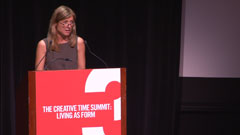Neue Slowenische Kunst (NSK)
Neue Slowenische Kunst (German for "New Slovenian Art") is an artist collaborative whose projects comment on globalization, totalitarianism, and society's misconception of democracy in Eastern Europe. NSK members use visual art, theater, graphics, film and video, theory, and music to convey their sociopolitical message. The famous project State in Time (1991) defined NSK as a utopian 'state' at the collapse of Yugoslavia and alludes to the plight of micronations striving for legitimacy. Further linking the political and the artistic, NSK issued fictional passports as part of the project Towards a Double Consciousness (Lagos, 2010) to point out the ambiguous and ephemeral definition of citizenship, identity, and nationhood. Recent organized programs include First NSK Citizens' Congress (Berlin, 2010), where citizens gathered to debate cultural policy and theory, and Beautiful Country (Leipzig, 2011), a provocative state-art exhibition. NSK events, concerts, exhibitions, newspapers, panel discussions, and performances have been featured internationally, shedding light on the continuation of extreme nationalism and political uncertainty.
Based in Ljubljana, Slovenia.

